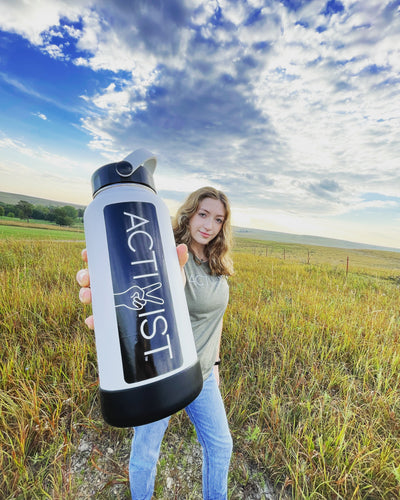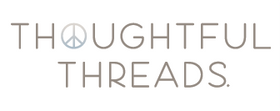Eco-Conscious FAQs

Be the Change You Want to See
Thirsty Tees: How much water did it take to produce your favorite t-shirt?
It takes 713 gallons of water—or a 2-1/2 year supply of drinking water for one person— to yield the cotton necessary to manufacture just a single t-shirt.
The Thoughtful Threads Solution
Our tri-blend garments are made of 25% organic U.S.-grown cotton (which uses 91% less water than non-organic cotton); 25% super soft modal; and 50% recycled polyester made from recycled plastic.
The tri-blend t-shirts we use are manufactured by AllMade and BellaCanvas. Each shirt saves approximately 76 gallons of water compared to conventionally-made tees.
What is modal fabric?
Modal fabric is a bio-based fabric made from spinning reconstituted beech tree cellulose. An eco-friendly alternative to cotton, beech trees require very little water to grow and the production process uses about 10 to 20 times less water.
What happens to clothes after we’re done with them?
According to the EPA, Americans generate 16 million tons of textile waste each year. Of that, 10 million tons of clothing end up in landfills. Synthetic clothing, like polyester, is responsible for up to 35% of micro plastics that end up in the oceans.
The Thoughtful Threads Solution
Our t-shirt fabric is partially sourced from recycled plastic bottles. As a sustainable alternative, each t-shirt prevents an equivalent of six recycled plastic bottles from ending up in the ocean. Also, our shirts are not rapidly produced, high-volume garments made of low-quality materials, you'll want to keep your Thoughtful Threads for a very long time.
But, are they comfortable?
Yes! Our soft, eco-friendly shirts not only reduce our carbon footprint, they are incredibly soft, true-to-size and designed to move with your body instead of clinging to it.
What is an ethically-made garment?
Modern day slave labor and child labor is rife in the supply chains of the fashion industry. According to the International Labour Organisation, nearly 170 million children are forced into child labor, which means they are doing work below the required minimum age or working in detrimental and hazardous conditions. Millions of these children can be found working the world’s cotton fields and laboring in cotton processing factories. Child labor deprives children of schooling, trapping them in vicious cycles of poverty.
Companies that produce ethically-made garments purchase cotton from ethically certified cotton suppliers; are transparent about their hiring practices; offer fair wages; and provide healthy, safe working conditions. Check out Fair Trade International and B-Corp certified labels for more information about how they assess a company’s environmental, social and economic impact.
The Thoughtful Threads Solution
We print our PVC and phthalate-free designs on t-shirts produced by Allmade and BELLA+CANVAS.
In addition to its focus on sustainable materials that are kind to the planet, AllMade is focused on breaking the cycle of poverty and child abandonment in Haiti. AllMade pays three to four times the local minimum wage in Haiti, which enables its workers to care for their children, build balanced lives, and live in a supportive community near their workplace. Vocational training and opportunities for advancement are also available.
BELLA+CANVAS produces garments in the U.S. and overseas in fair trade factories that follow their ethical policies.

